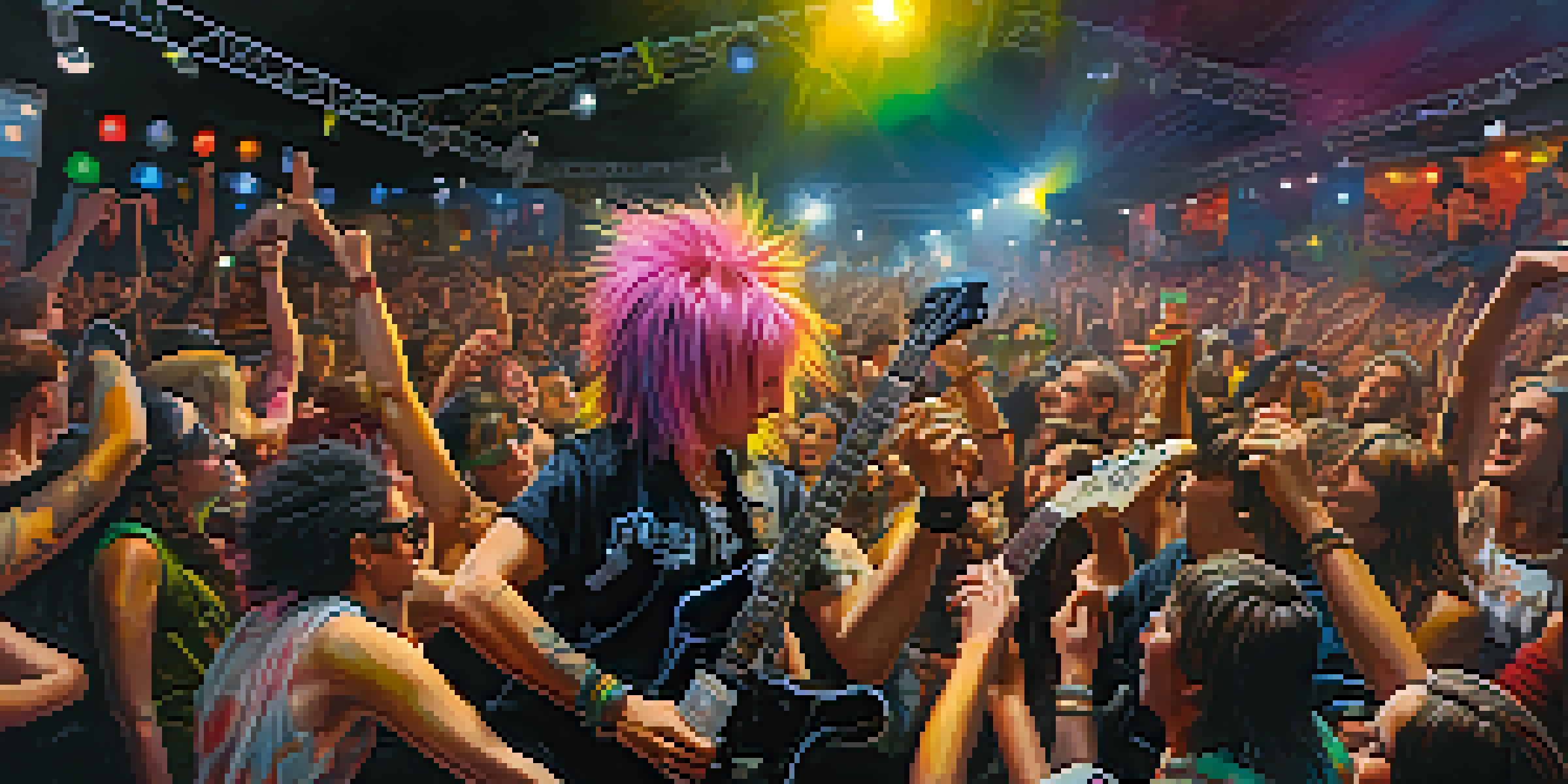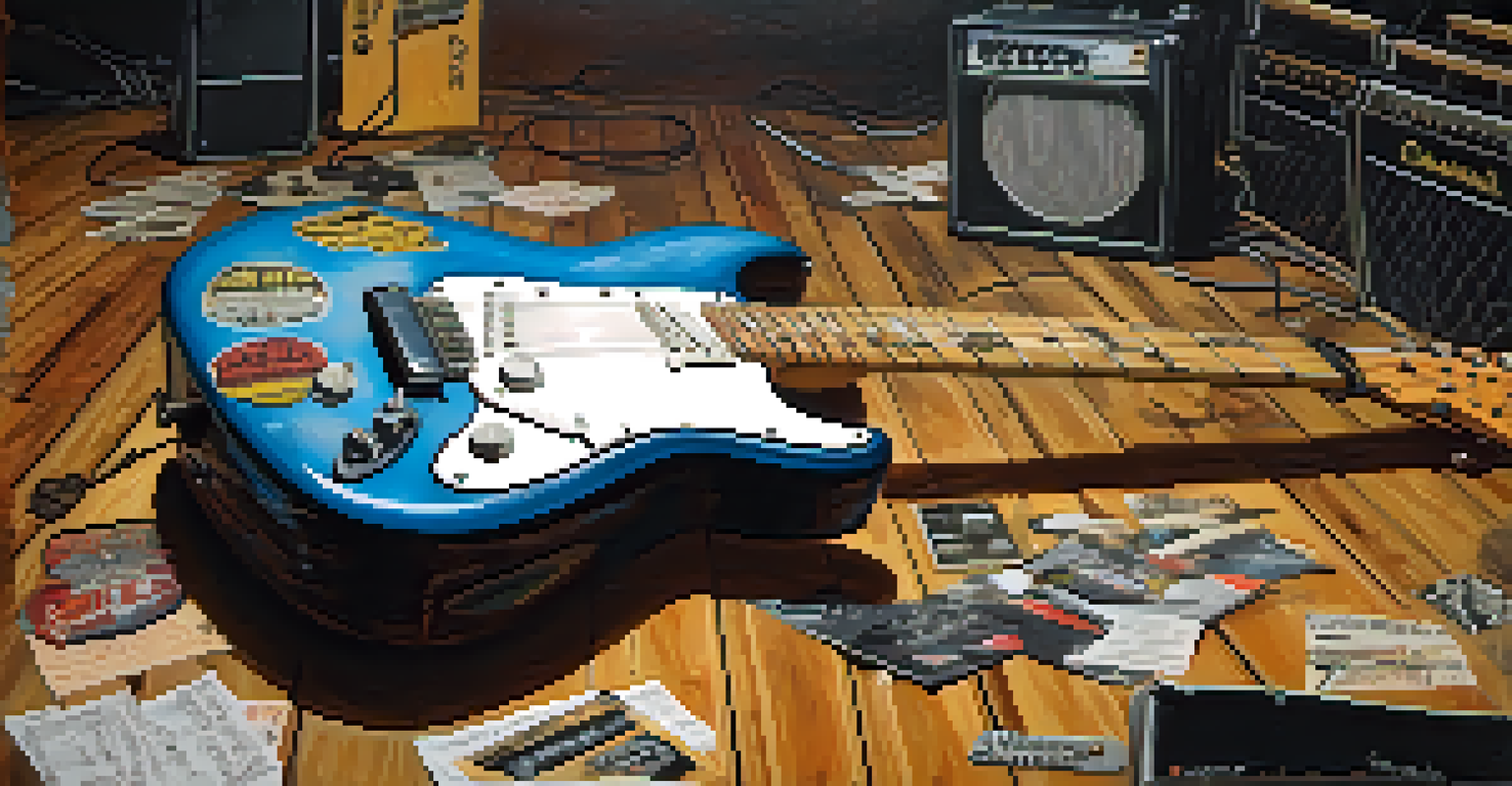Punk Rock Revolution: Guitars and Raw Sound Waves

The Birth of Punk Rock: A Sonic Uprising
Punk rock emerged in the 1970s as a rebellious response to the mainstream music scene. Bands like The Ramones and The Sex Pistols stripped down rock to its raw essentials, creating a sound that was both abrasive and infectious. This movement wasn't just about music; it was a cultural shift that resonated with disenchanted youth everywhere.
Punk is musical freedom. It's saying, doing, and playing what you want.
The energy of punk rock was palpable, with fast tempos and short songs that packed a punch. The guitars played a crucial role, often featuring distorted riffs that could be heard from blocks away. This raw sound waved goodbye to the polished productions of previous decades, instead opting for an authentic feel that spoke directly to its audience.
Punk's DIY ethos encouraged bands to record and distribute their music independently. This not only democratized music production but also fostered a community of like-minded individuals who valued authenticity over commercial success. It was a true revolution, redefining what it meant to be a musician.
Guitar Techniques That Defined the Genre
In punk rock, the guitar isn't just an instrument; it's a weapon of expression. Players often employ power chords—two or three-note chords played on the lowest strings—to create that signature gritty sound. This simple yet effective technique allows for a driving energy that fuels the genre's dynamic.

Feedback and distortion became staples in punk guitar playing, producing a raw sound that echoed the rebellious spirit of the music. Techniques such as palm muting and aggressive strumming create an auditory experience that feels both chaotic and exhilarating. It's a sonic landscape that invites listeners to immerse themselves fully.
Punk Rock: A Cultural Revolution
Emerging in the 1970s, punk rock was a rebellious movement that redefined music and culture for disenchanted youth.
Moreover, punk rock guitarists often rejected elaborate solos in favor of catchy hooks and memorable riffs. This approach made the music accessible to all, encouraging fans to pick up guitars themselves. The focus shifted from technical prowess to creating an impactful, visceral experience, making punk rock truly revolutionary.
Iconic Punk Rock Bands and Their Sound
Many bands have left an indelible mark on the punk rock landscape, each contributing to its unique sound. The Clash, for instance, blended punk with reggae and rockabilly, proving that punk could be versatile and innovative. Their album 'London Calling' is a testament to how punk could evolve while retaining its core ethos.
The only way to deal with bullies is to stand up to them. Punk rock is a way to do that.
Another groundbreaking band is Misfits, known for their horror-inspired themes and aggressive sound. Their heavy use of guitar distortion and catchy melodies created an atmosphere that was both dark and captivating. This blend of aesthetics and sound helped to establish a subculture within punk music.
Then there's Green Day, who brought punk rock into the mainstream with their album 'Dookie.' Their catchy hooks and relatable lyrics made punk more accessible to a wider audience, encouraging a new generation to embrace the genre. Each of these bands showcases how diverse punk rock can be while still holding onto its raw roots.
The Role of DIY Culture in Punk Rock
At the heart of punk rock lies a strong DIY (Do It Yourself) culture that emphasizes independence and grassroots creativity. Bands often recorded their music in basements and garages, circumventing traditional record labels that sought to control the creative process. This spirit of self-sufficiency empowered countless musicians to forge their own paths.
DIY culture extended beyond music production; it permeated everything from album artwork to merchandise. Punk bands often designed their own flyers, album covers, and shirts, creating a visual identity that matched their sound. This personalization made fans feel more connected to the music and its creators.
DIY Culture Fuels Punk's Growth
The DIY ethos in punk rock empowered musicians to create independently, fostering a strong sense of community and creativity.
The punk rock DIY ethos also fostered a sense of community, with bands supporting each other through shared resources and venues. Independent record labels flourished, allowing more artists to reach audiences without mainstream constraints. This collaborative spirit remains a cornerstone of punk rock today, inspiring new generations of musicians.
Punk Rock's Influence on Modern Music
The impact of punk rock can be felt across various genres of modern music, influencing everything from pop to metal. Many contemporary artists draw inspiration from punk's rebellious spirit and raw sound, infusing their own work with its energy. Bands like Paramore and Fall Out Boy, for instance, incorporate punk elements into their catchy melodies and themes.
Moreover, punk rock's ethos of authenticity resonates with today's musicians, encouraging them to speak their truth and stay true to their artistic vision. This influence is particularly evident in the rise of genres like pop-punk and emo, which blend the catchy hooks of pop with the angst-driven narratives of punk.
Even genres like hip-hop have embraced punk's DIY roots, with artists creating music outside the traditional industry framework. This blending of styles highlights punk's versatility and its ability to adapt while maintaining its core message of individuality and rebellion.
The Legacy of Punk Rock in Today's Society
Punk rock's legacy extends beyond music; it has shaped cultural movements and social attitudes throughout the years. Its messages of anti-establishment and self-expression resonate with many, inspiring activism and social change. From protests to grassroots movements, the punk ethos encourages people to fight for what they believe in.
The punk aesthetic—a mix of edgy fashion, colorful hairstyles, and bold art—continues to influence contemporary culture. Fashion designers often draw from punk styles, and street art is heavily inspired by its visual rebellion. This ongoing influence proves that punk is not just a genre but a lifestyle that encourages creativity and nonconformity.
Punk's Influence on Modern Music
Punk rock's legacy continues to shape modern music and culture, inspiring artists across genres to embrace authenticity and rebellion.
As new generations discover punk rock, its messages of empowerment and resistance remain relevant. Whether through music, art, or activism, punk rock continues to inspire and challenge societal norms, proving that its revolution is far from over.
Embracing the Punk Rock Revolution Today
In a world that sometimes feels overly sanitized, punk rock offers a refreshing reminder to embrace authenticity. Whether you're a seasoned musician or a casual listener, the punk rock revolution invites you to express yourself freely. Picking up a guitar and playing a few power chords can be incredibly liberating, no matter your skill level.
Punk rock also encourages fans to support local artists and independent venues, fostering a sense of community. Attending live shows, buying merch directly from bands, and participating in local events helps keep the spirit of punk alive. By actively engaging in this culture, you contribute to the ongoing revolution.

Finally, understanding the history and principles of punk rock can inspire you to challenge norms in your own life. Embrace your individuality, question the status quo, and don’t be afraid to make some noise. Punk rock teaches us that everyone has a voice worth hearing, and that’s a lesson that will never go out of style.